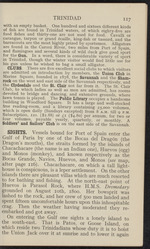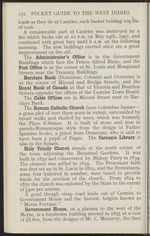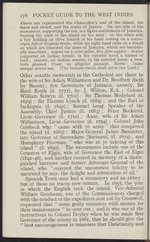| 1 |
 |
“...TRINIDAD
117
with an empty basket. One hundred and sixteen different kinds
of fish are found in Trinidad waters, of which eighty-five are
food fishes and thirty-one are not used for food. Cavalli or
carangue, tarpon or grand écaille, king-fish or tassard, and the
barracouta are the most highly prized by sportsmen. Alligators
are found in the Caroni River, two miles from Port of Spain,
and flamingoes and several kinds of wild duck give good sport
for the Gun. In a word, there is considerable variety of sport
in Trinidad, though the winter visitor would find little use for
his gun unless he wished to bag a small alligator.
CLUBS. There are five excellent social clubs to which visitors
are admitted on introduction by members, the Union Club in
Marine Square, founded in 1878, the Savannah and the Sham-
rock on the west and east side of the Savannah respectively and
the Clydesdale and the St. Clair not far from it. The St. Clair
Club, to which ladies as well as men are admitted, has rooms
devoted...”
|
|
| 2 |
 |
“...i72 POCKET GUIDE TO THE WEST INDIES
loads as they do at Castries, each basket holding 109 lbs.
of coal.
A considerable part of Castries was destroyed by a
fire which broke out at 11 p.m. on May 14th, 1927» an<^
continued with great fury until 6 a.m. on the following
morning. The new buildings erected since are a great
improvement on the old.
The Administrator’s Office is in the Government
Buildings which face the Prince Alfred Basin, and the
Post Office is at the comer of St. Louis and Mongiraud
Streets near the Treasury Buildings.
Barclays Bank (Dominion; Colonial and Overseas) is
at the comer of Micoud and Bridge Streets, and the
Royal Bank of Canada at that of Victoria and Bourbon
Streets opposite the offices of the Castries Town Board.
The Cable Offices are in Micoud Street next to Bar- ]
clays Bank.
The Roman Catholic Church faces Columbus Square—
a grass plot of over three acres in extent, surrounded by j
broad walks and shaded by trees, which was formerly
the Place d’Armes. It is...”
|
|
| 3 |
 |
“...and sword, and the scales of Justice. On one side of the
monument, supporting the urn, is a figure emblematic of Jamaica,
bearing the crest of the island on her zone ; on the other side
a boy holding an olive branch in his hand resting on a cornu-
copia full of tropical fruits, while his right hand rests on a shield
on which are blazoned the arms of Jamaica, which are heraldic-
ally described : argent on a cross gules, five pine-apples ; dexter
supporter an Indian female, in her exterior hand a basket of
fruit; sinister, an Indian warrior, in his exterior hand, a bow,
both plumed. Crest, an alligator passant. Motto: Indus
uterque serviel uni. (The Indians twain shall serve one Lord.)
Other notable memorials in the Cathedral are those to
the wife of Sir Adam Williamson and Dr. Brodbelt (both
by Bacon); five Governors of Jamaica, namely, Sir
Basil Keith (d. 1777), by J. Wilton, R.A.; Colonel
William Selwyn (d. 1702); Sir Thomas Modyford (d.
1679) : Sir Thomas Lynch (d. 1684); and the Earl of...”
|
|
